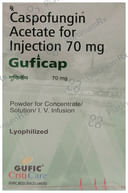Caspofungin
Uses
Caspofungin is used to treat severe fungal infections.
How it Works
How Caspofungin works Caspofungin kills fungi by inhibiting their ability to produce a protective covering.
Side Effects
Common side effects of Caspofungin include chills, decreased potassium levels in the blood, diarrhea, fever, increased alkaline phosphatase levels in the blood, increased liver enzymes, and rash.
Expert Advice
- Caspofungin is administered as a slow drip into a vein (IV infusion) under the supervision of a doctor.
- Do not skip any doses and complete the full course of treatment, even if you feel better.
- Your doctor may monitor your liver function regularly.
- Inform your doctor if you experience:
- Abdominal pain
- Loss of appetite
- Darkened urine
- Yellowing of the eyes or skin (jaundice)
- Notify your doctor if you are pregnant, planning to become pregnant, or breastfeeding.
Related Medications
Caspofungin 70mg

₹10,000

₹3,046.3
MRP ₹4,686.6
Caspofungin 70mg

₹4,999

₹3,046.3
MRP ₹4,686.6
Caspofungin 70mg

₹9,990

₹3,046.3
MRP ₹4,686.6
Caspofungin 70mg

₹13,088.8

₹3,046.3
MRP ₹4,686.6
Caspofungin 70mg

₹16,000

₹3,046.3
MRP ₹4,686.6
Caspofungin 70mg

₹11,925

₹3,046.3
MRP ₹4,686.6
Caspofungin 70mg

₹11,900

₹3,046.3
MRP ₹4,686.6
Caspofungin 70mg

₹10,000

₹3,046.3
MRP ₹4,686.6
Caspofungin 70mg

₹16,500

₹3,046.3
MRP ₹4,686.6
Caspofungin 70mg

₹16,000

₹3,046.3
MRP ₹4,686.6
Caspofungin 50mg

₹15,000
Caspofungin 50mg

₹10,000
Caspofungin 50mg

₹9,000
Caspofungin 50mg

₹7,929
Caspofungin 50mg

₹9,999
Caspofungin 50mg

₹10,571.4
Caspofungin 50mg

₹3,400
Caspofungin 50mg

₹13,115
Caspofungin 50mg

₹16,240
Caspofungin 50mg

MRP ₹9,850
Caspofungin 50mg

₹9,995
Caspofungin 50mg

₹4,499
Caspofungin 50mg

₹9,300
Caspofungin 50mg

₹9,990
Caspofungin 50mg

₹7,980
Flat ₹100 off on first app order | Use Code: APP100 |
Flat ₹100 off on first app order
USE CODE: APP100

Download Now